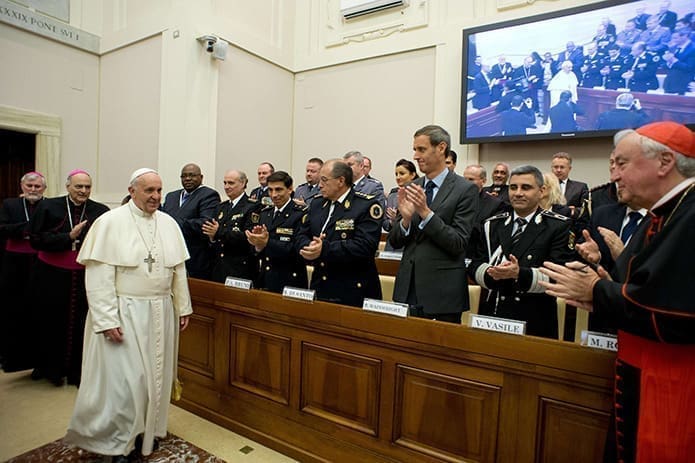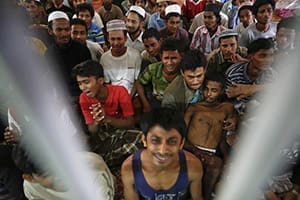 CNS photo/L'Osservatore Romano via Reuters
CNS photo/L'Osservatore Romano via ReutersAtlanta
Vatican conference on human trafficking was ‘an awakening,’ Bishop Zarama says
By PRISCILLA GREEAR, Special to the Bulletin | Published May 1, 2014
ATLANTA—Bishop Luis R. Zarama participated in an April conference at the Vatican on combating human trafficking where he gained insights into how the U.S. Catholic Church can partner with law enforcement to rescue and bring healing to victims of enslavement.
Bishop Zarama, an auxiliary bishop of Atlanta, represented the U.S. Conference of Catholic Bishops’ Committee on Migration. Some 120 religious leaders, humanitarian workers, men and women Religious, victims of human trafficking and representatives of national and international police agencies attended.
The April 9-10 second international conference on trafficking was hosted by the Bishops’ Conference of England and Wales and Cardinal Vincent Nichols of Westminster. Pope Francis addressed the assembly April 10.
At the end of the meeting, an international group of senior law enforcement chiefs pledged to meet in London in November to share expertise, training and practical steps to fight human trafficking, which is the coerced use of people for slave labor and sexual exploitation.
As he digested the findings, Bishop Zarama said in an interview following the conference that his conscience was heightened and his heart was awakened to the responsibility of the Catholic Church to build awareness of and fight these crimes that poison the body of Christ.
“The pope is trying to help us to understand it’s a crime against humanity,” he said. “For me it was an awakening, a call to see the reality that we didn’t know existed—that we think is far away for us but is a reality that is there.”
To better understand the American situation, he earlier visited Nogales, Ariz., on the U.S.-Mexican border where he spoke with border patrol officers and victims. He learned enslavement often begins when members of drug cartels kidnap women and use them as prostitutes.
“That was my first direct exposure to dealing with that issue,” he said. “The cartels are in control of the border and … they try to recruit young men and women to carry drugs to the other side,” he said.
At the conference Bishop Zarama said he was inspired to action by the call for justice of Pope Francis, who was greatly admired by all gathered—whatever their religion.
The pope called trafficking “an open wound on the body of contemporary society, a scourge upon the body of Christ” that demands continued collaboration between the church and law enforcement and twin strategies of police cracking down on criminals and church and social workers aiding victims. The pope called the Vatican meeting “a gesture of the church and of people of good will who want to scream, ‘Enough!’”

Human trafficking victims from Myanmar are held in a detention cell near the Thailand-Malaysian border, Feb. 13. Pope Francis has raised the blight of human trafficking onto the global stage, calling it “a crime against humanity” and decrying the world’s indifference. CNS photo/Damir Sagolj, Reuters
The conference showcased a joint initiative between police and the church that began in London three years ago. Detective inspector Kevin Hyland of Scotland Yard explained how when the police conduct raids on suspected brothels and potential crime scenes they have a group of nuns speak with the women found inside because they often don’t want to talk to the police.
“They have been able to work together and they are looking to share in different countries that model that is working in England and Wales,” said Bishop Zarama.
He recalled the testimony of one victim who urged law enforcement to build more trust with the abused.
“They are afraid because they have been abused physically and emotionally. … One victim said that law enforcement needed to come to those areas where they are working not only one time but many times” to create space for them to speak out, he recounted. “The traffickers take away every document as a way to control them. They are afraid because they don’t have documents. They are afraid of being arrested.”
Traffickers often promise impoverished people a better life in another country but then entrap them into slave labor or prostitution.
“They are looking for ways to escape from poverty. … (Traffickers) use their hopes for a better life and they destroy their lives,” Bishop Zarama said. “It’s difficult for them to start to trust again. It’s a process to learn how to deal with these people who are suffering and desperate.”
Conference victims described how they fell into the snares of criminal gangs. A woman from Hungary told how her sister had sold her into slavery and she was separated from her 2-year-old daughter and even “traded for a car” by her traffickers. She was abused, beaten and bullied by the family housing her, including the family’s 3-year-old boy, and was forced to prostitute herself for three years.
Bishop Zarama also noted a more subtle form of exploitation when Americans hire undocumented immigrants and then don’t pay the agreed-upon wage.
“People are looking to make some money and unfortunately we sometimes take advantage of that,” he said.
He said the conference was a first step to encourage church collaboration with law enforcement and to develop more awareness and proactive strategies in Atlanta and nationally. He asked Catholics to pray for victims of human trafficking and to be watchful for those around them who may be a suffering victim, whether in the pews around them or encountered in ministry.
At the conference Cardinal Nichols reported that only 1 percent of people in slavery are identified and rescued. Interpol Secretary-General Ronald Noble reported the United Nations estimates that 2.4 million people are trafficked at any given time and the trafficking generates $32 billion in annual profits for criminals.
Bishop Zarama reflected on the significance of the conference being held at the beginning of Holy Week as a sign of the church’s solidarity with victims’ suffering and hope for liberation.
“The cross is not the end,” he said. “It’s hope in the Resurrection. It’s little steps in moving in the direction of helping these people who are now suffering.”